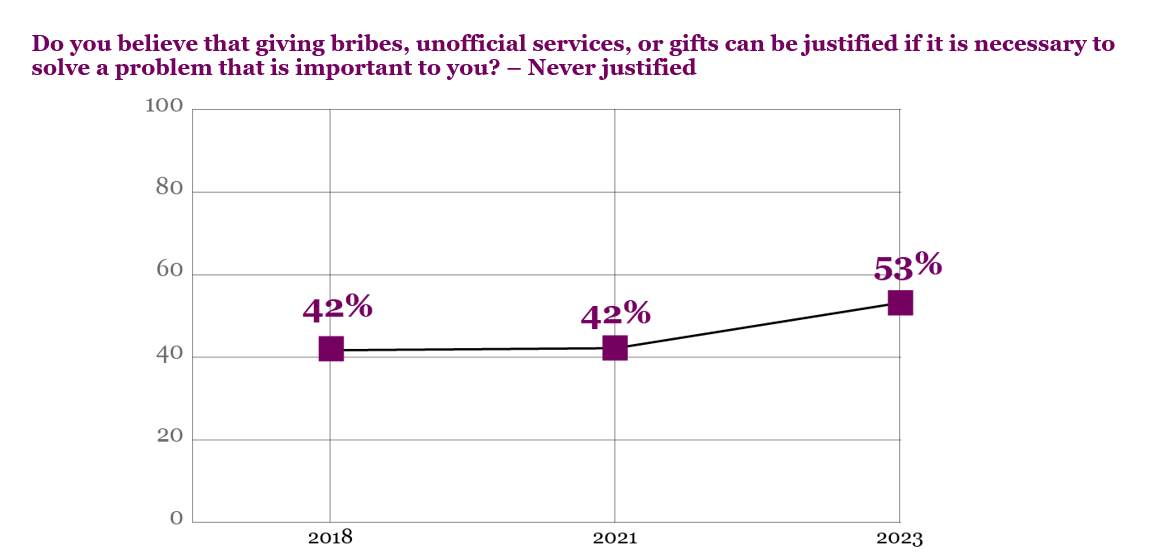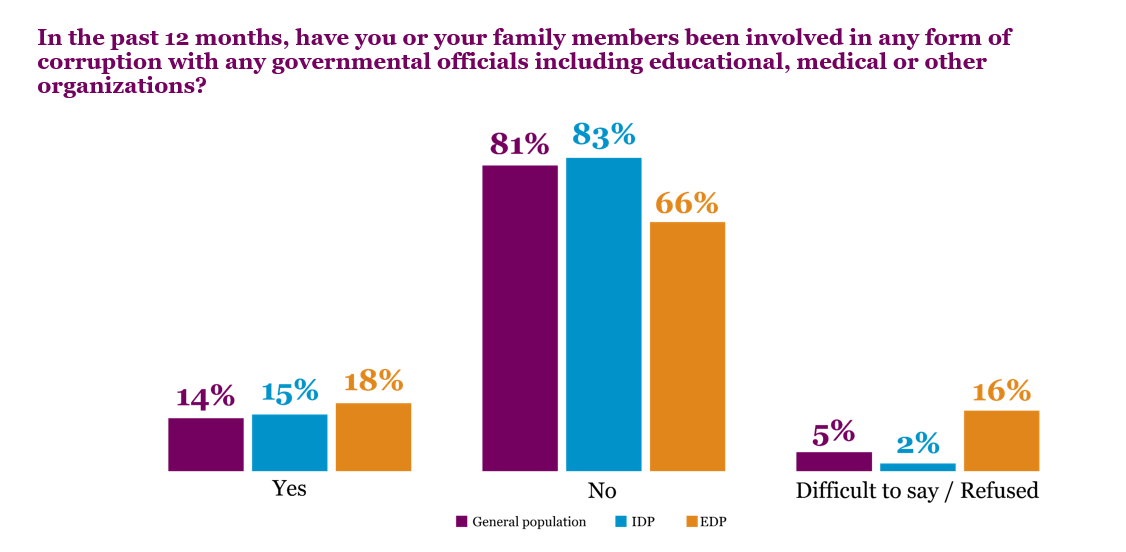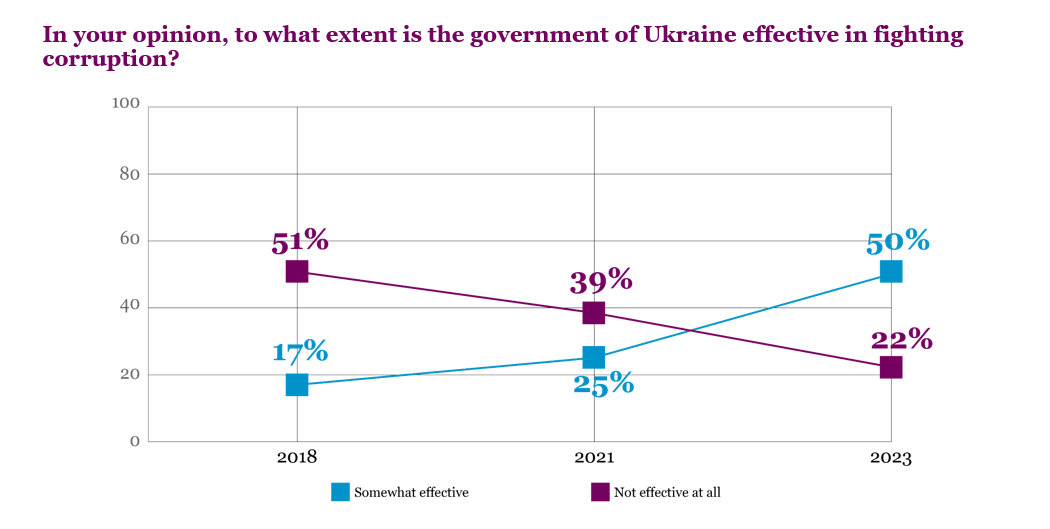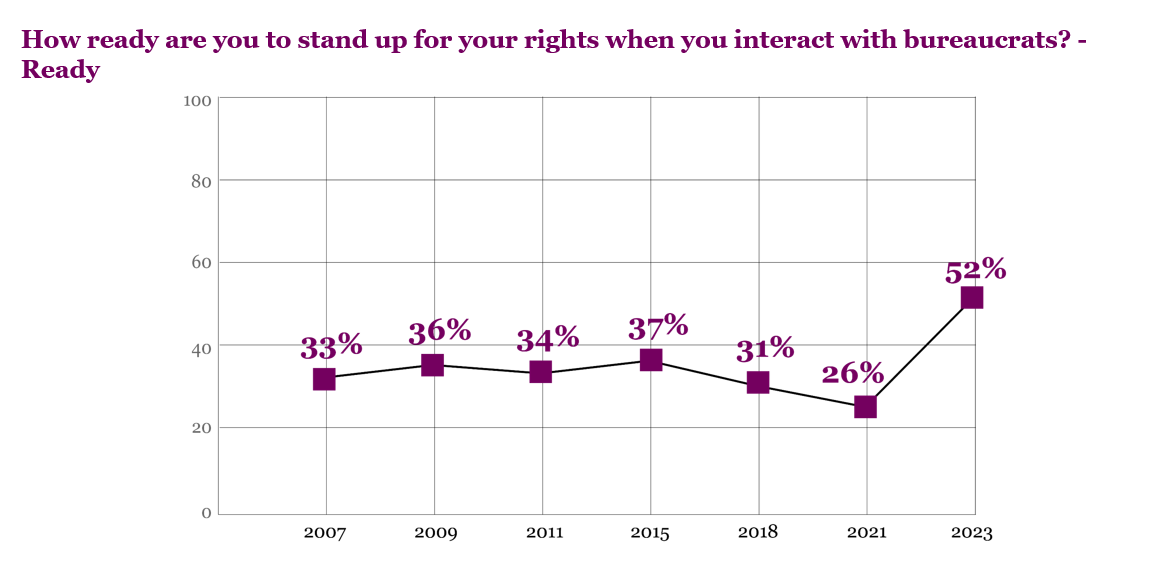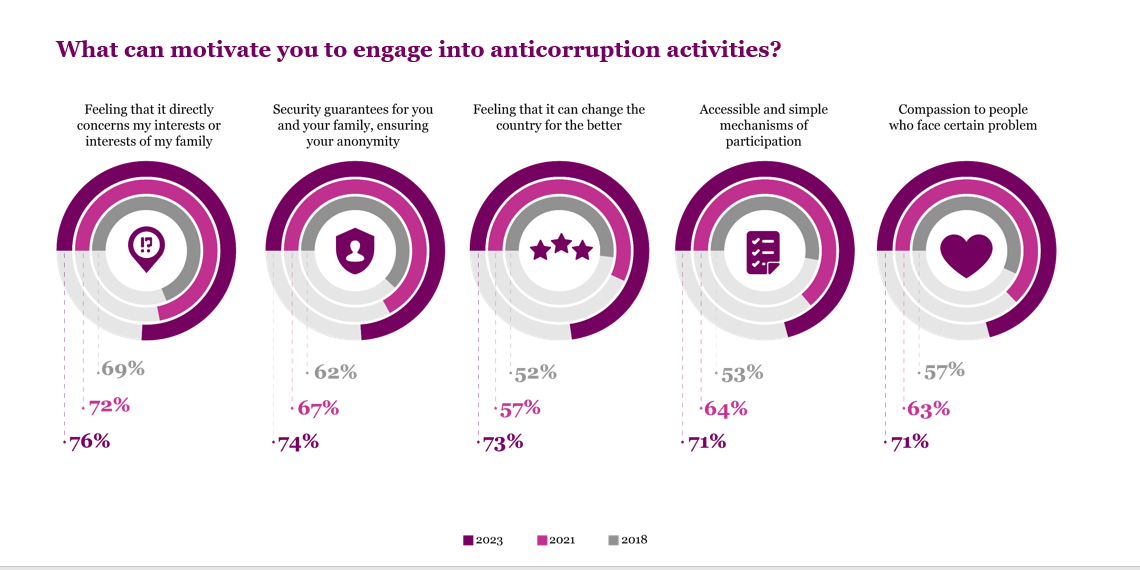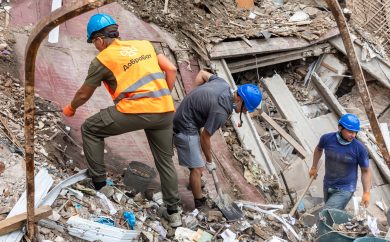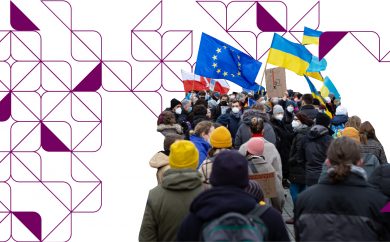War on Corruption: Ignited by Patriotic Zeal, Ukrainians Exude Unprecedented Faith in Government, but Suggest that the Anti-Corruption Crusade is Far from Over
Pact, in conjunction with SACCI, presents key findings from the 7th installment of The Corruption Perception and Experience National Poll. Conducted during the winter of 2023, the poll was commissioned under the USAID/ENGAGE Activity, and in close partnership with SACCI. For the first time since 2007, the poll covered three different representative samples of respondents to understand the perceptions and experiences of Ukrainian citizens who find themselves in different war-affected realities: 1) Ukrainians who did not change their place of residence after Russia’s full-scale invasion (general population); 2) internally displaced Ukrainians (IDPs); and 3) externally displaced Ukrainians (EDPs).
Second only to the war, corruption is perceived as the most serious problem in Ukraine by 89% of citizens, with grand political corruption identified as the main and most serious type (81%). Despite a notable improvement in the public perception of corruption prevalence, 94% of respondents still consider corruption to be pervasive across Ukraine. The percentage of those who believe corruption has increased since the start of the war exceeds those who think it has declined, and society remains highly divided on the issue.
While 53% of respondents believe that corruption cannot be justified under any circumstances (a significant increase from the previous year), only a small percentage sought redress after experiencing corruption. The share of respondents who believe it is the responsibility of regular citizens to tackle corruption has increased from 9% in 2021 to 13% in 2023, but the majority still place the primary responsibility on the President and his Office (44%). Less than 2% believe civil society organizations have this duty.
Notably, the specialized anti-corruption agencies witnessed an increase in citizens’ trust compared to 2021. The most significant gain has been seen in the Security Service of Ukraine (trusted by 40% in 2023 compared to 12% in 2021) and the National Police (31% and 11% respectively).
The awareness of anti-corruption reforms or campaigns by state institutions and CSOs has decreased compared to 2018, but the perception of their effectiveness has significantly increased. Almost 80% of citizens express a willingness to participate in organized actions against corruption, although most prefer passive forms of engagement such as reporting corruption cases to the media and posting on social media (31%), as well as signing petitions (27%).
Overall, internally displaced Ukrainians demonstrate the greatest optimism in perception and assessment of corruption levels and anti-corruption activities among all three samples of respondents, while externally displaced Ukrainians are disenchanted with Ukraine’s anti-corruption progress.
Unmasking Corruption: Divergent Perceptions and Underreported Cases Illuminate a National Challenge
Corruption is considered a rather serious or very serious problem for Ukraine by 89% of respondents and is second only to Russia’s full-scale invasion in the opinion of the general population and EDPs. IDPs rank corruption as the third most pertinent problem for the country after the war, the high cost of living and low salaries. EDPs tend to consider all key problems in Ukraine to be less serious than the general population and IDPs, particularly when it comes to assessing the gravity of corruption, high costs of living, low salaries, unemployment, and the high cost and low quality of medical services. Compared to the other two samples, IDPs are more concerned about Russia’s war, the high cost of living and low salaries, unemployment, drug abuse, and the high cost and quality of public services.
Ukrainian society, including all three survey samples, is highly divided in their assessment of what happened with corruption since the outbreak of the war: more than one-fifth believe that corruption has increased since February 2022, while slightly less than one-fifth consider corruption to have decreased, and over one-third perceive corruption to have remained at the same level. Importantly, 20% or more of respondents in each sample have refused to provide a specific opinion on the question. Focus groups’ participants were also divided: nearly half believed that corruption has increased since the start of the war, while the rest were equally split in saying that corruption has remained the same or decreased. IDPs and EDPs tend to be both less optimistic than the general population about the state of corruption after February 2022 and more uncertain about what has happened.
Ukrainians are more assertive in their perception of the prevalence of corruption in Ukraine: only 5% of respondents provided no opinion, while 94% believe it is common to some degree or another. Although the share of Ukrainians who think corruption is “very common” has dropped by more than 20% compared to 2018 and 2021, the overall public perception that corruption is a widespread phenomenon in Ukraine remains. This finding was confirmed during focus groups, the participants of which unanimously considered corruption to be widespread or very widespread in all regions of Ukraine, drawing attention to a “corruption vertical” and “extensive system of corruption” in the country.
While Ukrainians recognize the gravity and widespread nature of corruption as a major societal problem, the level of reported intolerance towards giving bribes, gifts, or providing unofficial services to resolve a personal problem has notably increased among the general population. In the view of 53% of respondents from that sample, such actions can never be justified, compared to 42% in 2018 and 2021. IDPs are the least tolerant of using corrupt schemes to resolve a personal issue, with 58% of that sample indicating that such a course of action could never be justified. Less than 40% of EDPs share that view.
Fourteen percent of the general population and a similar share of IDPs have reported that over the past 12 months, they or their family members have been involved in some form of corruption, including bribe extortion or voluntarily offering unofficial payments in money, gifts, or services. EDPs were more likely to mention their experiences with corruption over the past year (18%) and, at the same time, were less open to providing an answer to the question (16% of EDPs refused or found it hard to answer, compared to 5% in the general population and 2% among IDPs).
Citizens are still unlikely to report corruption. Only 8% of respondents from the general population, 10% of IDPs, and 11% of EDPs who or whose family faced corruption in the last 12 months have filed a complaint with the government or law enforcement agency. Fifty-seven percent of the general population sample who have faced corruption did not complain about it because they thought such efforts would be in vain.
Corruption Crackdown: Absence of Tangible Action Overshadows Growing Trust
Ukrainians’ trust in state and non-state institutions has substantially increased since the start of Russia’s full-scale invasion and is at the highest level since 2007. Similarly, citizens’ perception of the eagerness to eradicate corruption has increased for all state and non-state actors without exception. Yet, Ukrainians overwhelmingly believe that non-state actors (ordinary citizens, CSOs, mass media, and the business community) are more genuine in their ambition to overcome corruption than state institutions (with the President and his Office being the only exception).
While trust in state institutions and the perception of their eagerness to fight corruption increased, respondents from the general population sample place more responsibility for eradicating corruption in Ukraine onto themselves (13% in 2023 vs 9% in 2021), regional and local level governments. Compared to other samples of respondents, EDPs have notably lower expectations from the central branches of the government to lead the fight against corruption and place that responsibility onto specialized state agencies, such as HACC, NACB, and SAPO.
All the specialized agencies responsible for countering corruption gained citizens’ trust compared to 2021. The most significant gain has been seen in the Security Service of Ukraine (trusted by 40% in 2023 compared to 12% in 2021) and the National Police (31% and 11% respectively). State Investigation Bureau, SAPO, HACC, NAPC, NABU, and Prosecutor Office increased their level of trust from an average of 6-7% in 2021 to 17-18% in 2023.
While trust in CSOs has increased from 25% in 2021 to 42% in 2023, no more than 3% of respondents from all survey samples believe that fighting corruption should be the responsibility of non-governmental organizations.
Ukrainians’ perception of the five most corrupt sectors of public life has remained unchanged: customs (40%), the court system (39%), the Prosecutor’s Office (32%), healthcare (31%), and land issues (29%).
Unwavering Hope: Citizens Keep Confident in Anti-Corruption Efforts Amidst Waning Awareness
Citizen awareness of anti-corruption activities, reforms, and campaigns implemented by the state and non-state actors has significantly decreased across the board. The President and his Office are leading the race among state institutions with a 10% rate of declared public awareness of their anti-corruption activities (a more than two-fold decrease since 2018), while awareness of anti-corruption work of other state agencies does not exceed 6%. Awareness of CSOs’ anti-corruption activities has gone down more than six-fold, from 21% in 2018 to 3% in 2023.
The respondents who consider themselves aware of state and non-state anti-corruption efforts perceive the effectiveness of such efforts significantly higher compared to 2018 and 2021. Data from the last three rounds of the Corruption Perception and Experience Poll suggests a pattern that holds true for all state and non-state actors: the lower the level of public awareness of their anti-corruption activities, the higher the respondents’ assessment of their effectiveness.
Despite significantly decreased awareness of anti-corruption activities, the number of respondents from the general population who believe that the overall government’s fight against corruption is somewhat effective has grown nearly three-fold, from 17% in 2018 to 50% in 2023, while the percentage of those who believe they are not “effective at all” has dropped from 51% to 22%.
CSOs and specialized anti-corruption agencies are receiving increasingly positive evaluations of the effectiveness of their work. Among the former, the Security Service of Ukraine is perceived to be the most effective, more than doubling its citizens’ effectiveness rating compared to 2021. For the first time since 2018, citizens perceive the effectiveness of state-specialized anti-corruption agencies’ activities higher than the activity of CSOs and the mass media.
Accelerating the Fight: Citizens’ Drive to Combat Corruption Takes Subtle but Potent Turn
The percentage of respondents believing that citizens have absolutely no influence on corruption levels in the country has decreased from 18% in 2021 to 14% in 2023. At the same time, strengthening public control over the government is a less popular measure (11% in 2023 vs. 16% in 2021) through which citizens could exercise their role in preventing corruption.
The general level of public approval for citizens complaining about corruption has grown from 71% in 2021 to 81% in 2023, while the percentage of Ukrainians who declare their readiness to stand up for their rights when interacting with officials has reached 52% – the highest level observed since 2007. IDPs (58%) are the most articulate about their readiness to defend their rights, while EDPs (42%) are the least likely to do so.
The most common reactions to the violation of one’s rights are demanding that the official fulfil their duties (44%), complaining to their manager (36%), and applying to law enforcement bodies or courts (34%). Readiness to undertake each of these steps has noticeably increased compared to 2021. Although declining over time, the main reason for citizens not taking action to address corruption remains the skepticism regarding the success of such steps.
The percentage of citizens who declare their readiness to join organized action to counter corruption has significantly increased, but most often respondents are willing to engage in passive forms of anti-corruption activities: reporting corruption encounters to the mass media or posting them on social networks (31% compared to 22% in 2021) and signing petitions (27% compared to 23% in 2021).
Ukrainians who relocated internally or externally indicate a higher readiness to join the fight against corruption. Seventeen percent of IDPs and 15% of EDPs declare their readiness to support anti-corruption CSOs and civic initiatives and join their activities, notably surpassing the 11% of Ukrainians who did not change their place of residence since the start of the war. Only 10% of EDPs refuse to participate in anti-corruption activities, compared to 20% of the general population.
Being directly affected by corruption remains the main motivating factor for the general population to engage in anti-corruption activities. At the same time, the two enablers of civic participation in the fight against corruption that has seen the most significant change since 2021 are triggered by patriotic sentiments: the desire to change the country for the better (+16%) and a sense of civic duty (+15%).
Feeling physical insecurity for oneself and one’s family remains the main barrier to citizens’ participation in the fight against corruption among the general population (60%). Representatives of this sample feel that their low awareness of anti-corruption tools (57%), lack of trust in authorities as anti-corruption champions (56%), and lack of trust in anti-corruption CSOs (51%) are stronger barriers to engagement than a lack of time (50%), the risk of being fired (49%), or unwillingness to make one’s case public (47%). The participants of the focus groups identified a lack of belief in the effectiveness of individual actions as a significant obstacle for Ukrainians to engage in the fight against corruption. They recommended that showcasing successful examples, enhancing civic awareness, and improving knowledge of laws could serve as valuable means to encourage citizen participation.
About the 2023 Corruption Perception and Experience Poll
The 2023 Corruption Perception and Experience Poll gauges Ukrainians’ opinions on, perceptions about, and experiences with corruption. This poll builds upon the methodology designed under the MSI-ACTION project in 2007 and 2009, which was further implemented by Pact under USAID/UNITER (2011 and 2015), and subsequently under USAID/ENGAGE in partnership with USAID/SACCI (2018 and 2021).
Commissioned under ENGAGE in collaboration with SACCI, the 2023 Corruption Perception and Experience Poll was conducted by the Kyiv International Institute of Sociology (KIIS). For the first time since 2007, KIIS polled three distinct population samples: 1) Ukrainians who did not change their place of residence after Russia’s full-scale invasion (general population); 2) internally displaced Ukrainians (IDPs); and 3) externally displaced Ukrainians (EDPs).
The general population sample included 10,117 citizens, 18 years of age and older who resided within Ukraine, excluding the Autonomous Republic of Crimea, Donetsk, Zaporizhzhia, Luhansk, Mykolaiv, Odesa, Kharkiv, and Kherson oblasts and who were not considered internally displaced persons. This sample was formed through the random walk approach with quota selection at the final stage and was surveyed through face-to-face interviews.
The second sample of 1,000 IDPs from 18 oblasts of Ukraine was generated through the random walk and time-sampling approaches and was surveyed through face-to-face interviews.
The third sample of 2,000 EDPs from 42 countries worldwide was generated using a snowball technique and surveyed through self-administered online interviews and interviews conducted via messaging platforms.
KIIS completed the polling fieldwork between December 6, 2022, and February 2, 2023. The statistical margin of error (with a probability of 0.95 and design effect of 1.5) is less than or equal to 1.5% for results nearing 50%, 1.3% for results close to 25% or 75%, 1.0% for results close to 12% or 88%, 0.6% for results close to 5% or 95% and, finally, 0.3% for results that near 1% or 99%.
In addition to the quantitative survey, throughout April 2023, KIIS conducted 10 focus group discussions (FGDs), including 2 FGDs with residents of Odesa/Dnipro, 2 FGDs with residents of Kyiv/Cherkasy, 2 FGDs with residents of Ternopil/Chernivtsi, 2 FGDs with residents of liberated territories and 2 FGDs with IDPs. A total of 70 people took part in the FGDs.

